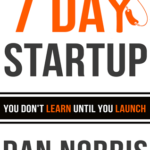The Start-up f YouU
Reid Hoffman
Act like an entrepreneur in your career.
Don’t be the next Detroit; bloated, slow, and based on hubris.
“Three years is an eternity in Silicon Valley, and startups can’t plan that far in advance. Instead, Netflix stays nimble and iterates, always in the test phase. We call this mindset “permanent beta.”
Finished ought to be an F-word for all of us. We are all works in progress.
Keeping your career in permanent beta forces you to acknowledge that you have bugs, that there’s new development to do on yourself, that you will need to adapt and evolve.
1. Develop a Competitive Advantage
If you try to be the best at everything and better than everyone (that is, if you believe success means ascending one global, mega leaderboard), you’ll be the best at nothing and better than no one. Instead, compete in local contests—local not just in terms of geography but also in terms of industry segment and skill set.
A. Assets are what you have right now. Before dreaming about the future or making plans, you need to articulate what you already have going for you.
B. Aspirations and values are the second consideration. Aspirations include your deepest wishes, ideas, goals, and vision of the future, regardless of the state of the external world or your existing asset mix. – become a powerhouse investigator/owner in the tri-state.
C. The Market Realities – If someone won’t pay you for your services in the career marketplace, it’s going to be a very hard slog.
All Advantages Are Local: Pick a Hill That Has Less Competition
How to Pivot: learn skills on the side.
Is the worst-case scenario tolerable or intolerable? High-level execs and CEOs didn’t put RISK assessment into convoluted mathematical models but instead boiled down the problem to one single yes or no question.
If the worst-case scenario is getting fired, losing a little bit of time or money, or experiencing discomfort, as long as you have a solid and reliable Plan Z in place, you will still be in the game and should be open to taking on that risk. Don’t conflate uncertainty with risk.
You pursue opportunities that have a lower risk than your peers think, but which are still high-reward.
In the long run, though, low volatility leads to increased vulnerability, because it renders the system less resilient to unthinkable external shocks.

 The Startup Owner’s Manual – Steve Blank
The Startup Owner’s Manual – Steve Blank